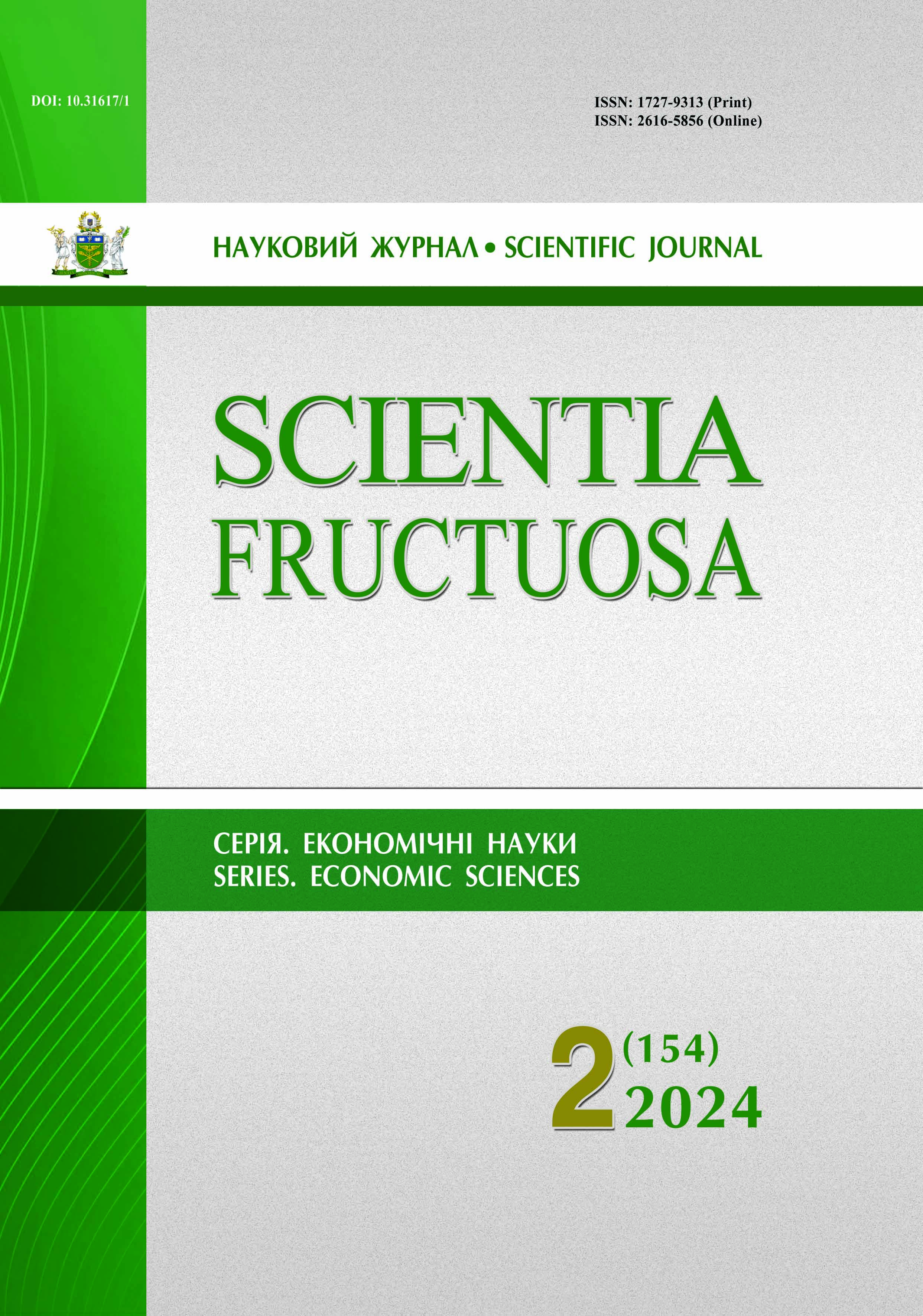Штучний інтелект у бухгалтерській діяльності
DOI:
https://doi.org/10.31617/1.2024(154)08Ключові слова:
штучний інтелект, інформаційні системи бухгалтерського обліку, професійне судження бухгалтера, професійна етика, професійний скептицизмАнотація
Технології штучного інтелекту (ШІ) відкривають широкі можливості для підвищення ефективності бізнесу та розвитку різних сфер професійної діяльності, підвищуючи їх продуктивність і конкурентоспроможність. Ведеться активний пошук підходів до використання ШІ-технологій у бухгалтерській сфері, обіцяючи легку заміну людини машиною. Метою статті є узагальнення набутого досвіду, визначення перспектив, обмежень і ризиків використання ШІ-технологій у сфері професійної діяльності бухгалтера. В основу дослідження покладено гіпотезу, що широке використання ШІ у професійній діяльності бухгалтера за недостатнього рівня професійного скептицизму і обережності несе вагомі загрози і ризики як для бухгалтера, так і для бізнесу загалом. Використано методи наукового пошуку, порівняльного і критичного аналізу, теоретичного узагальнення та синтезу. Передумовою для впровадження ШІ-технологій у бухгалтерську діяльність є експертні інформаційні системи і ERP-системи. Результати аналізу досвіду впровадження ШІ-технологій у різних галузях доводить доцільність їх використання в бухгалтерській сфері при виконанні ряду рутинних завдань (автоматичного розпізнавання первинних документів, обробки вхідних сигналів та інших стандартних операцій з одночасним зниженням імовірності виникнення помилок), аналізі великих масивів даних та інформаційній підтримці прийняття рішень (опрацювання бізнес-даних і нормативних документів), навчання фахівців, організації внутрішньої та зовнішньої комунікації (зокрема між людиною і машиною). Виявлені ймовірні ризики порушення приватності і безпеки даних; неправильної інтерпретації вихідних даних; ігнорування контексту діяльності, зовнішнього і внутрішнього середовищ, зокрема через відсутність емоційного інтелекту, що визначає рівень довіри до інтегрованих інформаційних систем. Вимога застосування професійних оцінок і суджень, встановлена нормативними документами відповідальність бухгалтерів за прийняття рішень та надану інформацію обмежують сферу використання ШІ-технологій у бухгалтерській діяльності. Подальші дослідження планується спрямувати на вивчення можливостей широкої інтеграції ШІ-технологій в ІСБО та вдосконалення законодавчих норм на основі принципу оцінки ризику
Посилання
Abdullah, A. A. H., & Almaqtari, F. A. (2024). The impact of artificial intelligence and Industry 4.0 on transforming accounting and auditing practices. Journal of Open Innovation: Technology, Market, and Complexity, 10(1). https://doi.org/10.1016/j.joitmc.2024.100218
Alter Systems. (2023). Artificial intelligence in ERP. Date of publication 04.08.2023. https://altersystems.-com.ua/shtuchnij-intelekt-v-erp/
Barcaui, A., & Monat, A. (2023). Who is better in project planning? Generative artificial intelligence or project managers? Project Leadership and Society, (4). https://doi.org/10.1016/j.plas.2023.100101
Cao, P. (2023). Research on the impact of artificial intelligence-based e-commerce personalization on traditional accounting methods. International Journal of Intelligent Networks, (4), 193-201. https://doi.org/10.1016/j.ijin.2023.07.004
European Commission (2023). Hiroshima Process International Code of Conduct for Advanced AI Systems. Publication 30 October. https://digital-strategy.ec.europa.eu/en/library/hiroshima-process-international-code-conduct-advanced-ai-systems
Fomina, O., Zadniprovsky, O., Korol, S., & Romashko, O. (2022). Professional judgement in accounting: contents and conditions of application. Business: Theory and Practice, 23(1), 26-38. https://doi.org/10.3846/btp.2022.13330
Han, H., Shiwakoti, R. K., Jarvis, R., Mordi, C., & Botchie, D. (2023). Accounting and auditing with blockchain technology and artificial Intelligence: A literature review. International Journal of Accoun-ting Information Systems, (48). https://doi.org/10.1016/j.accinf.2022.100598
IFAC (2018). International Federation of Accountants. The International Code of Ethics for Professional Accountants (including International Independence Standards). https://mof.gov.ua/storage/files/kodex_et.pdf
Karbon (n.d.). Are accounting jobs safe in a world of ChatGPT and AI? Last accessed 09.02.2024. https://karbonhq.com/resources/accounting-jobs-safe-chatgpt-ai/
Khalifeh, T. (2023). Accounting in the Age of Generative AI. Strategic Finance, 16.10.2023. https://www.sfmagazine.com/articles/2023/october/accounting-in-the-age-of-generative-ai?_gl=1*-rgwrwe*_ga*MTcyODE1MzkyMi4xNzA0ODE2MTQy*_ga_BFP14JSJ0G*MTcwNDgxNjE0MS4xLjEuMTcwNDgxNjcxMC42MC4wLjA.*_gcl_au*MjM4MDEzMzIuMTcwNDgxNjE0MA
Meservy, R. D., Denna, E. L., & Hansen, J. V. (1992). Application of artificial intelligence to accounting, tax, and audit services: Research at Brig-ham Young University. Expert Systems with Appli-cations, 4(2). https://doi.org/10.1016/0957-4174(92)90112-6
Norzelan, N. A., Mohamed, I. S., & Mohamad, M. (2024). Technology acceptance of artificial intelli-gence (AI) among heads of finance and accounting units in the shared service industry. Technological Forecasting and Social Change, (198). https://doi.org/10.1016/j.techfore.2023.123022
Recommendation of the Council on OECD Legal Instruments Artificial Intelligence. 22.05.2019. OECD/LEGAL/0449. https://oecd.ai/en/assets/files/-OECD-LEGAL-0449-en.pdf
Sutton, S. G., Holt, M., & Arnold, V. (2016). "The reports of my death are greatly exaggerated" - Artificial intelligence research in accounting. International Journal of Accounting Information Systems, (22), 60-73. https://doi.org/10.1016/j.accinf.2016.07.005
Termin.in.ua (n.d.). Artificial intelligence (AI) - what it is, how it works and why it is needed. Date of appeal 12.02.2024. https://termin.in.ua/shtuchnyy-intelekt/
The European AI Alliance. Shaping Europe's digital future (n.d.). Last accessed 14.02.2024. https://digital-strategy.ec.europa.eu/en/policies/european-ai-alliance
Yao, L., & Jin, M. (2023). Research on Accounting Data Encryption Processing System based on Artificial Intelligence. Procedia Computer Science, (228), 373-382. https://doi.org/10.1016/j.procs.2023.11.043
Zhang, C., Zhu, W., Dai, J., Wu, Y., & Chen, X. (2023). Ethical impact of artificial intelligence in managerial accounting. International Journal of Accounting Information Systems, (49). https://doi.org/10.1016/j.accinf.2023.100619
Bilyk, M. Yu., Moroz, O. V., & Latyshev, K. O. (2024). The use of artificial intelligence in the marketing activities of enterprises. Efficient economy, (1). https://doi.org/10.32702/2307-2105. 2024.1.49
Law of Ukraine No. 996-XIV of 16.07.1999. "On Accounting and Financial Reporting in Ukraine". https://zakon.rada.gov.ua/laws/show/996-14#Text
Kovalenko, М. М., Shevchenko, М. М., & Bilins-ka, О. П. (2023). Artificial Intelligence in Human Resource Management: Future Development Perspectives. Efficient economy, (4). https://doi.org/10.32702/2307-2105.2023.11.51
Kolesnikov, A. P., & Karapetyan, A. M. (2023). Artificial intelligence: advantages and threats of use. Efficient economy, (8). https://doi.org/10.32702/2307-2105.2023.8.9
The Concept of Artificial Intelligence Development in Ukraine: Order of the Cabinet of Ministers of Ukraine dated 02.12.2020. No 1556-r. https://zakon.rada. gov.ua/laws/show/1556-2020-%D1%80#n8
Korol, S., & Gnasko, A. (2021) Ethics of professional accountants as a factor of influence on the economic environment. Business Inform, (12), 217-224. https://doi.org/10.32983/2222-4459-2021-12-217-224
Korol, S., & Klochko, A. (2020). Digital techno-logies in accounting and audit. State and regions. Series: Economics and Entrepreneurship, 1 (112), 170-176. https://doi.org/10.32840/1814-1161/2020-1-29
Lebedenko, S. O. (2023). Artificial intelligence in marketing. Efficient economy, (4). https://doi.org/10.32702/2307-2105.2023.4.38
Ruda, O. L. (2024). Artificial intelligence and directions of use in banking. Efficient economy, (1). https://doi.org/10.32702/2307-2105.2024.1.50
Fostolovich, V. A. (2022). Artificial intelligence in modern business: potential, modern trends and prospects for integration into various spheres of economic activity and human life. Efficient economy, (7). https://doi.org/10.32702/2307-2105.2022.7.4
##submission.downloads##
Опубліковано
Як цитувати
Номер
Розділ
Ліцензія

Ця робота ліцензується відповідно до Creative Commons Attribution 4.0 International License.
Ліцензія Creative Commons Зазначення Авторства 4.0 Міжнародна (CC BY 4.0)







